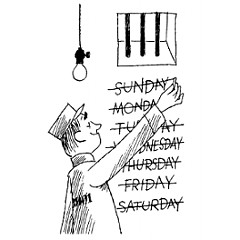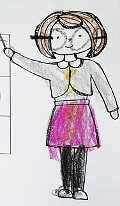The surprise exam
Preface
 This was written in 2009. I explain why I think the surprise exam paradox is just a subtle version of the paradox of the heap. This was not easy to figure out because this is one of the most confusing paradoxes in the world.
This was written in 2009. I explain why I think the surprise exam paradox is just a subtle version of the paradox of the heap. This was not easy to figure out because this is one of the most confusing paradoxes in the world.
 This was written in 2009. I explain why I think the surprise exam paradox is just a subtle version of the paradox of the heap. This was not easy to figure out because this is one of the most confusing paradoxes in the world.
This was written in 2009. I explain why I think the surprise exam paradox is just a subtle version of the paradox of the heap. This was not easy to figure out because this is one of the most confusing paradoxes in the world.
11. References
Many thanks to John N. Williams for showing me how to think about the surprise exam using the concept of a blindspot.
Countless things have been written on this paradox and even a causal discussion with friends can quickly get wild and confusing! The following struck a chord with me in one way or another and helped me get my head around the problem.
 Martin Gardner, The Unexpected Hanging and Other Mathematical Diversions (Simon & Schuster 1969), Chapter 1.
Martin Gardner, The Unexpected Hanging and Other Mathematical Diversions (Simon & Schuster 1969), Chapter 1.
 Doris Olin, Paradox (McGill-Queen’s 2003), Chapter 3.
Doris Olin, Paradox (McGill-Queen’s 2003), Chapter 3.
 R. M. Sainsbury, Paradoxes (Cambridge 1995), Chapter 4, sections 4.2 and 4.3.
R. M. Sainsbury, Paradoxes (Cambridge 1995), Chapter 4, sections 4.2 and 4.3.
 Roy Sorensen, Blindspots (Oxford 1988), Chapters 7, 8, 9.
Roy Sorensen, Blindspots (Oxford 1988), Chapters 7, 8, 9.
 Tom Tymoczko & Jim Henle, Sweet Reason: A Field Guide to Logic (Key College 2004), pp. 420-5.
Tom Tymoczko & Jim Henle, Sweet Reason: A Field Guide to Logic (Key College 2004), pp. 420-5.
 John N. Williams, ‘The Surprise Exam Paradox: Disentangling Two Reductios,’ Journal of Philosophical Research, vol. 32, 2007.
John N. Williams, ‘The Surprise Exam Paradox: Disentangling Two Reductios,’ Journal of Philosophical Research, vol. 32, 2007.


Picture from Martin Gardner, The Unexpected Hanging and Other Mathematical Diversions (Simon & Schuster 1969 )The paradox is often raised in terms of a man condemned to be hanged. He is told by the judge that the hanging will take place at noon on one day of the following week but that he will not know which day it is until the morning of the hanging.
The man reasons that the judge cannot keep his word and is subsquently surprised to find the gallows being set up on, say, Wednesday morning.
D. J. O’Connor may have been the first to mention the paradox in print. In his 1948 article, ‘Pragmatic Paradoxes,’ in the philosophy journal Mind, O’Connor describes a military commander who announces that there will be a Class A blackout during the week, defined as a blackout that his men will not know is going to occur until after 6 pm of the day of its occurrence. O’Connor remarks, “It is easy to see that it follows from the announcement of this definition that the exercise cannot take place at all,” thereby suggesting that the commander’s announcement is self-refuting!
By the 1950s, the paradox was being circulated in the form of a surprise exam and it continues to be discussed in various forms to the present day even at the highest levels. The paradox remains popular because it is easily appreciated and very inviting of response. In terms of staying power and ability to provoke discussion, it is one of the best paradoxes of all time.
Sorensen’s Blindspots contains a wide-ranging and provocative discussion of the paradox’s many themes and also explains why the paradox is correctly attributed to Lennart Ekbom.
Gardner’s piece (listed above) is an entertaining introduction to the whole thing and absolutely the best place to start.
Tymoczko and Henle venture that the student’s logic may contain no error whatever. In their view, the student may be perfectly right to conclude that the teacher’s announcement is unknowable to the class!
 Doris Olin’s analysis of the paradox is found in the book listed above, whereas Raymond Smullyan’s characteristically crisp thoughts are found in his book, Forever Undecided: A Puzzle Guide to Gödel (Alfred A. Knopf, 1987).
Doris Olin’s analysis of the paradox is found in the book listed above, whereas Raymond Smullyan’s characteristically crisp thoughts are found in his book, Forever Undecided: A Puzzle Guide to Gödel (Alfred A. Knopf, 1987).
Many thanks to John N. Williams for showing me how to think about the surprise exam using the concept of a blindspot.
Countless things have been written on this paradox and even a causal discussion with friends can quickly get wild and confusing! The following struck a chord with me in one way or another and helped me get my head around the problem.








Picture from Martin Gardner, The Unexpected Hanging and Other Mathematical Diversions (Simon & Schuster 1969 )
The man reasons that the judge cannot keep his word and is subsquently surprised to find the gallows being set up on, say, Wednesday morning.
D. J. O’Connor may have been the first to mention the paradox in print. In his 1948 article, ‘Pragmatic Paradoxes,’ in the philosophy journal Mind, O’Connor describes a military commander who announces that there will be a Class A blackout during the week, defined as a blackout that his men will not know is going to occur until after 6 pm of the day of its occurrence. O’Connor remarks, “It is easy to see that it follows from the announcement of this definition that the exercise cannot take place at all,” thereby suggesting that the commander’s announcement is self-refuting!
By the 1950s, the paradox was being circulated in the form of a surprise exam and it continues to be discussed in various forms to the present day even at the highest levels. The paradox remains popular because it is easily appreciated and very inviting of response. In terms of staying power and ability to provoke discussion, it is one of the best paradoxes of all time.
Sorensen’s Blindspots contains a wide-ranging and provocative discussion of the paradox’s many themes and also explains why the paradox is correctly attributed to Lennart Ekbom.
Gardner’s piece (listed above) is an entertaining introduction to the whole thing and absolutely the best place to start.
Tymoczko and Henle venture that the student’s logic may contain no error whatever. In their view, the student may be perfectly right to conclude that the teacher’s announcement is unknowable to the class!

Menu
 What’s a logical paradox?
What’s a logical paradox? Achilles & the tortoise
Achilles & the tortoise The surprise exam
The surprise exam Newcomb’s problem
Newcomb’s problem Newcomb’s problem (sassy version)
Newcomb’s problem (sassy version) Seeing and being
Seeing and being Logic test!
Logic test! Philosophers say the strangest things
Philosophers say the strangest things Favourite puzzles
Favourite puzzles Books on consciousness
Books on consciousness Philosophy videos
Philosophy videos Phinteresting
Phinteresting Philosopher biographies
Philosopher biographies Philosopher birthdays
Philosopher birthdays Draft
Draftbarang 2009-2024  wayback machine
wayback machine
 wayback machine
wayback machine
 Paradox Lost (1971), by Ian Stewart.
Paradox Lost (1971), by Ian Stewart.